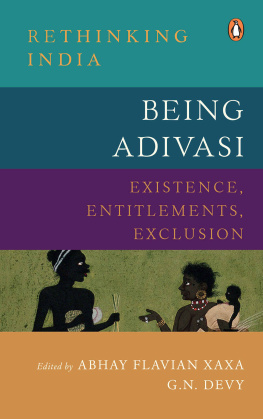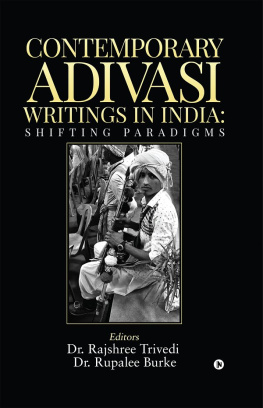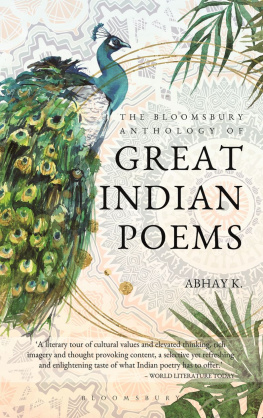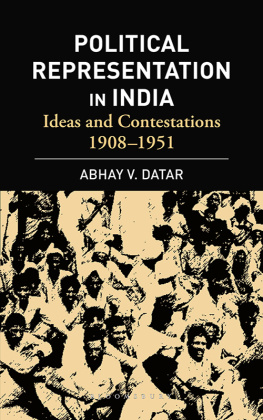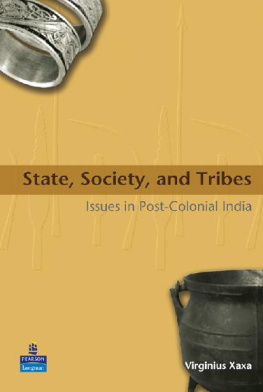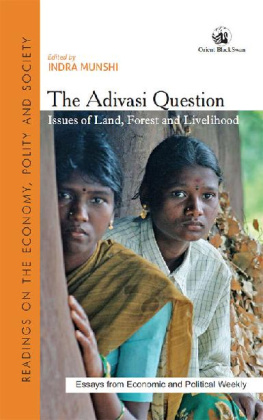Abhay Xaxa - Being Adivasi
Here you can read online Abhay Xaxa - Being Adivasi full text of the book (entire story) in english for free. Download pdf and epub, get meaning, cover and reviews about this ebook. year: 2021, publisher: Penguin Random House India Private Limited, genre: Politics. Description of the work, (preface) as well as reviews are available. Best literature library LitArk.com created for fans of good reading and offers a wide selection of genres:
Romance novel
Science fiction
Adventure
Detective
Science
History
Home and family
Prose
Art
Politics
Computer
Non-fiction
Religion
Business
Children
Humor
Choose a favorite category and find really read worthwhile books. Enjoy immersion in the world of imagination, feel the emotions of the characters or learn something new for yourself, make an fascinating discovery.
- Book:Being Adivasi
- Author:
- Publisher:Penguin Random House India Private Limited
- Genre:
- Year:2021
- Rating:4 / 5
- Favourites:Add to favourites
- Your mark:
- 80
- 1
- 2
- 3
- 4
- 5
Being Adivasi: summary, description and annotation
We offer to read an annotation, description, summary or preface (depends on what the author of the book "Being Adivasi" wrote himself). If you haven't found the necessary information about the book — write in the comments, we will try to find it.
Being Adivasi — read online for free the complete book (whole text) full work
Below is the text of the book, divided by pages. System saving the place of the last page read, allows you to conveniently read the book "Being Adivasi" online for free, without having to search again every time where you left off. Put a bookmark, and you can go to the page where you finished reading at any time.
Font size:
Interval:
Bookmark:


G.N.Devy

PENGUIN BOOKS

PENGUIN BOOKS
RETHINKING INDIA
Series editors: Aakash Singh Rathore, Mridula Mukherjee, Pushparaj Deshpande and Syeda Hameed
OTHER BOOKS IN THE SERIES
Vision for a Nation: Paths and Perspectives
(Aakash Singh Rathore and Ashis Nandy, eds)
The Minority Conundrum: Living in Majoritarian Times
(Tanweer Fazal, ed.)
Reviving Jobs: An Agenda for Growth
(Santosh Mehrotra, ed.)
We the People: Establishing Rights and Deepening Democracy
(Nikhil Dey, Aruna Roy and Rakshita Swamy, eds)
The Shudras: Vision for a New Path
(Kancha Ilaiah Shepherd and Karthik Raja Karuppusamy, eds)
Her Right to Equality: From Promise to Power
(Nisha Agrawal, ed.)
I Am Not Your Data
I am not your data, nor am I your vote bank,
I am not your project or any exotic museum object,
I am not the soul waiting to be harvested,
nor am I the lab where your theories are tested,
I am not your cannon fodder or the invisible worker,
or your entertainment at India Habitat Centre,
I am not your field, your crowd, your history,
your help, your guilt, medallions of your victory,
I refuse, reject, resist your labels,
your judgments, documents, definitions,
your models, leaders and patrons,
because they deny me my existence, my vision, my space,
your words, maps, figures, indicators,
they all create illusions and put you on a pedestal,
from where you look down upon me.
So I draw my own picture, and invent my own grammar,
I make my own tools to fight my own battle,
For me, my people, my world and my Adivasi self!
Abhay Flavian Xaxa*
* This poem by Abhay Flavian Xaxa was earlier published by Round Table India.
P sychologists tell us that the only true enemies we have are the faces looking back at us in the mirror. Today, we in India need to take a long, hard look at ourselves in the mirror. With either actual or looming crises in every branch of government, at every level, be it central, state or local; with nearly every institution failing; with unemployment at historically high rates; with an ecosystem ready to implode; with a healthcare system in a shambles; with an education system on the brink of collapse; with gender, caste and class inequities unabating; with civil society increasingly characterized by exclusion, intolerance and violence; with our own minorities living in fear; our hundreds of millions of fellow citizens in penury; and with few prospects for the innumerable youth of this nation in the face of all these increasingly intractable problems, the reflection is not sightly. Our true enemies are not external to us, not Pakistani terrorists or Bangladeshi migrants, but our own selves: our own lack of imagination, communication, cooperation and dedication towards achieving the India of our destiny and dreams.
Our Constitution, as the preamble so eloquently attests, was founded upon the fundamental values of the dignity of the individual and the unity of the nation, envisioned in relation to a radically egalitarian justice. These bedrock ideas, though perhaps especially pioneered by the likes of Jawaharlal Nehru, B.R. Ambedkar, M.K. Gandhi, Maulana Azad, Sardar Patel, Sarojini Naidu, Jagjivan Ram, R. Amrit Kaur, Ram Manohar Lohia and others, had emerged as a broad consensus among the many founders of this nation, cutting across divergent social and political ideologies. Giving shape to that vision, the architects of modern India strived to ensure that each one of us is accorded equal opportunities to live with dignity and security, has equitable access to a better life, and is an equal partner in this nations growth.
Yet, today we find these most basic constitutional principles under attack. Nearly all the public institutions that were originally created in order to fight against dominance and subservience are in the process of subversion, creating new hierarchies instead of dismantling them, generating inequities instead of ameliorating them. Government policy merely pays lip service to egalitarian considerations, while the actual administration of justice and implementation of laws are in fact perpetuating precisely the opposite: illegality, criminality, corruption, bias, nepotism and injustice of every conceivable stripe. And the rapid rise of social intolerance and manifold exclusions (along the lines of gender, caste, religion, etc.) effectively whittle down and even sabotage an inclusive conception of citizenship, polity and nation.
In spite of these and all the other unmentioned but equally serious challenges posed at this moment, there are in fact new sites for sociopolitical assertion re-emerging. There are new calls arising for the reinstatement of the letter and spirit of our Constitution, not just normatively (where we battle things out ideologically) but also practically (the battle at the level of policy articulation and implementation). These calls are not simply partisan, nor are they exclusionary or zero-sum. They witness the wide participation of youth, women, the historically disadvantaged in the process of finding a new voice, minorities, members of majority communities, and progressive individuals all joining hands in solidarity.
We at the Samruddha Bharat Foundation proudly count ourselves among them. The Foundations very raison dtre has been to take serious cognizance of Indias present and future challenges, and to rise to them. Over the past two years, we have constituted numerous working groups to critically rethink social, economic and political paradigms to encourage a transformative spirit in Indias polity. Over 400 of Indias foremost academics, activists, professionals and policymakers across party lines have constructively engaged in this process. We have organized and assembled inputs from jan sunwais (public hearings) and jan manchs (public platforms) that we conducted across several states, and discussed and debated these ideas with leaders of fourteen progressive political parties, in an effort to set benchmarks for a future common minimum programme. The overarching idea has been to try to breathe new life and spirit into the cold and self-serving logic of political and administrative processes, linking them to and informing them by grass-roots realities, fact-based research and social experience, and actionable social-scientific knowledge. And to do all of this with harmony and heart, with sincere emotion and national feeling.
In order to further disseminate these ideas, both to kick-start a national dialogue and to further build a consensus on them, we are bringing out this set of fourteen volumes highlighting innovative ideas that seek to deepen and further the promise of India. This is not an academic exercise; we do not merely spotlight structural problems, but also propose disruptive solutions to each of the pressing challenges that we collectively face. All the Her essays, though authored by top academics, technocrats, activists, intellectuals and so on, have been written purposively to be accessible to a general audience, whose creative imagination we aim to spark and whose critical feedback we intend to harness, leveraging it to further our common goals.
Font size:
Interval:
Bookmark:
Similar books «Being Adivasi»
Look at similar books to Being Adivasi. We have selected literature similar in name and meaning in the hope of providing readers with more options to find new, interesting, not yet read works.
Discussion, reviews of the book Being Adivasi and just readers' own opinions. Leave your comments, write what you think about the work, its meaning or the main characters. Specify what exactly you liked and what you didn't like, and why you think so.

